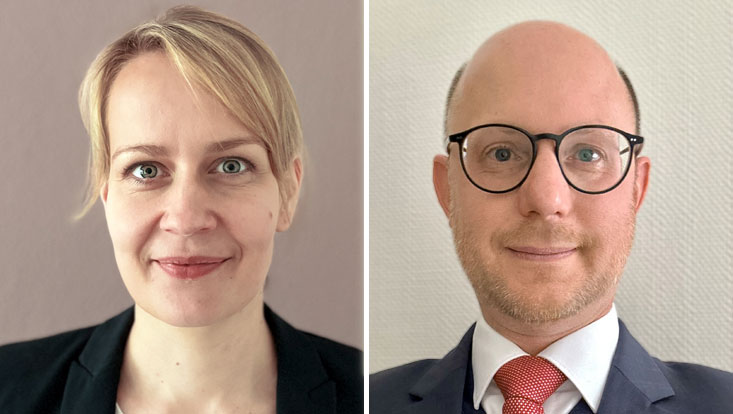New courses offered as part of the Studium GeneraleWhat is Ethics in the Natural Sciences Context?
14 September 2023, by Christina Krätzig

Photo: Private
As a University of Excellence, Universität Hamburg is again encouraging the formation of interdisciplinary teaching teams in 2023, to jointly develop an innovative teaching format. One of the four funded seminars will put ethical issues under the microscope as part of the Studium Generale.
Ms Riedner, Mr Himmel, what sort of topics will your seminar cover?
Himmel: We may cover, for example, genetically modified lifeforms, viruses, or even useful plants. Similarly, we may also explore new opportunities to use gene therapies for medical purposes, as science has made enormous advances in this field in recent years. Today for example, a simple blood test is enough for an expectant mothers to know if her unborn child is suffering from any genetic disorders. This also allows serious genetic defects, such as Down syndrome to be detected very early in pregnancy.
Riedner: And that from the tenth week of pregnancy, without any of the difficult and risky tests that used to be required, like amniotic fluid samples. This will have consequences however and there is a fear that these new tests may result in higher abortion rates of children with genetic disabilities. We are looking at the ethical and social aspects arising from the opportunities and risks provided by new diagnostic procedures.
Is the seminar topic already set?
Riedner: No, we want to determine the subjects in collaboration with students at the start of the seminar.
Himmel: The seminar is being conducted as part of the Studium Generale, but is also open to prospective natural scientists. Ms Reidner and I have already provided many seminars on ethical issues and good academic practice. Now we will have students with completely different backgrounds, and we are intrigued to see which topics and questions the participants find particularly interesting and the perspectives they will bring to them.
Can these kind of seminars be problematic for students of natural sciences? If someone does not want to support certain technologies, they would have to step out of research wouldn’t they?
Himmel: That is the question: is social discourse best served by opponents to a new technology simply stepping back from it? Wouldn’t it be better to identify problems and limitations, and to start the necessary conversation actively from within academia?
Riedner: Many students do not remain working in research. They are the decision-makers of tomorrow, in politics, or committees and organizations like health insurance providers. That is where the limits of the permissible are set, as well as the what is covered by public health insurance. From our point of view, it is important that the people in these positions have technical knowledge and an awareness of the ethical dimensions of their actions.
In your experience, how much interest do students have in these issues?
Himmel: Of the students participating in the required Biomedical Ethics seminar offered by the Department of Chemistry, I would estimate that about a quarter of them demonstrate not just interest, but previous knowledge as well. The issues covered in the classes sparks the interest of about 50 percent of the students, resulting in lively, productive conversations, while unfortunately, about a quarter of students don’t get as actively involved as we would like. But we do see how much of an effect the seminar has when previous participants regularly contact us with ethical questions.
Riedner: To reach this half of the student body, it is of course important that we offer enough interesting options, and for example, communicate the Universität Hamburg Guidelines on Good Research Practice. These are professionally-relevant issues that don’t get explored to this extent in other classes.
How will the new course work specifically?
Himmel: To allow enough time for interesting discussions to play out, we will offer four-hour block seminars during the first half of the coming winter semester.
Riedner: We also want to develop a podcast, to record which ethical questions were raised and how discussions proceeded in increasing detail. This will put an important instrument of academic communication in the hands of the students.
The Ethics and Responsibility in Life Sciences seminar offers 20 places for master’s students from all disciplines. The funds come from the Excellence Strategy of the Federal and State Governments.



